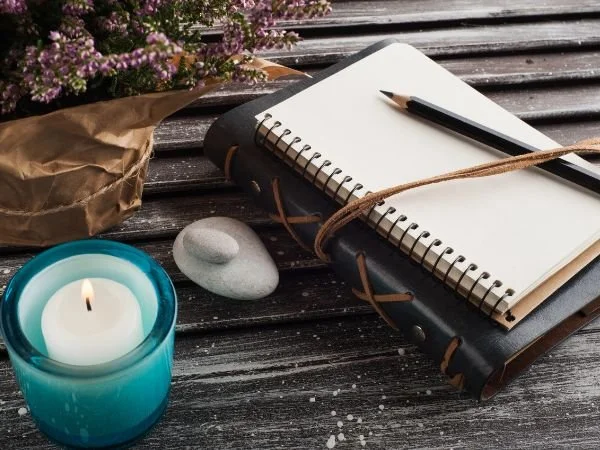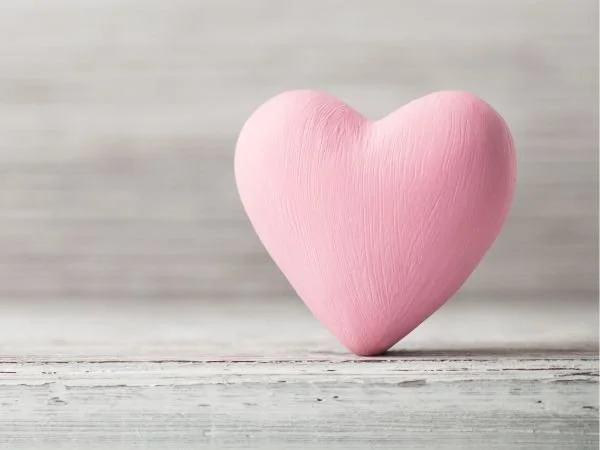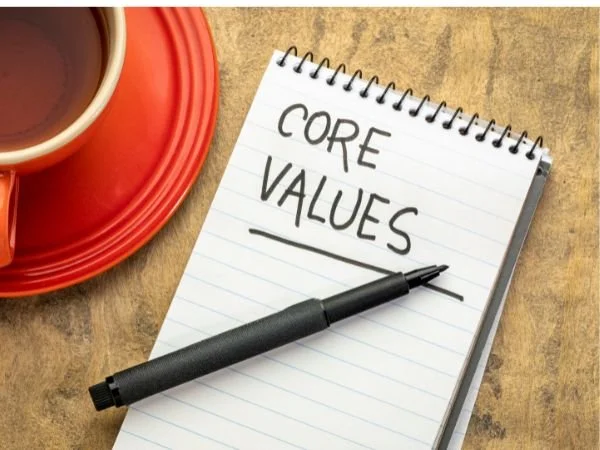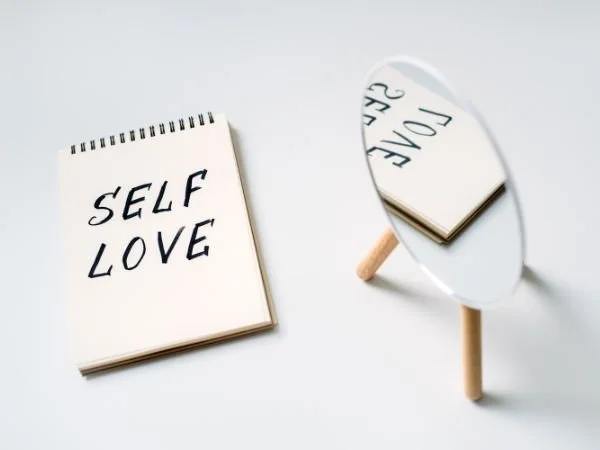05: Back to Basics: Self-Love, Inner Child, & Forgiveness
Amanda goes back to basics for this episode, and discuss what self-love, how to get in touch with your inner child, and why forgiveness is so important.
This post contains affiliate links to some of my favorite tools and resources. As an Amazon Associate, I earn from qualifying purchases. Full terms & conditions here.
In this episode, you will learn about:
What is self love
Why is self love so important
Practices for self love
What are boundaries and how are they a self love practice
What is my inner child
How do I communicate with my inner child
Why is forgiveness important
How to practice forgiveness
Episode References:
Atomic Habits: An Easy & Proven Way to Build Good Habits & Break Bad Ones by James Clear
It Wasn’t Your Fault: Freeing Yourself from the Shame of Childhood Abuse with the Power of Self-Compassion by Beverly Engel
Clip of therapy scene from Good Will Hunting
Here are some therapy resources I have posted before;
Therapy Aid (low cost therapy for essential workers, and a few other qualifying groups)
Check out my Instagram Post for Questions When Interviewing a Therapist
“Forgiveness is giving up the hope that the past could have been any different, it’s accepting the past for what it was, and using this moment and this time to help yourself move forward.” – Oprah Winfrey
Free Resource Corner
Check out my Self-Help Book Recommendation List
This is a list of books I recommend for your healing journey. There are so many self help books out there, so I put this resource together as a starting point for anyone looking to learn more.
Timestamps:
0:00 Intro
2:29 What is Self-Love and Why is it important?
20:06 What is the Inner Child?
37:50 Why is Forgiveness important?
Have you followed and left a review for New View Advice?
Let me know what you think of the podcast! Podcast followers and ratings help bring new listeners to the show, as well as help me to continue creating content. So if you enjoyed the show, I’d love to ask you to follow and leave a rating on your podcasting platform by:
Head to New View Advice on Apple or Spotify
Click Follow on your podcasting platform
Scroll down (or when promoted) click the 5 star rating!
-
NOTE: This podcast was transcribed by an AI tool called Otter. Please forgive any typos or errors
Amanda Durocher 0:00
Hey, before we get started, I just wanted to give you a heads up that this podcast discusses heavy topics as well as uses explicit language listener discretion is advised.
Amanda Durocher 0:11
Welcome to New View Advice, a safe place for you to ask your most vulnerable questions about life, relationships, healing, and so much more. I'm your host, Amanda Durocher, and I believe our fears and traumas are often what holds us back from living life to the fullest. Join me here each week as I offer advice on how to move through whatever is holding you back from being your best self. Let's get started. Hi, my name is Amanda Durocher and welcome to New View Advice. If you're new here, this is a podcast where I answer listener questions about life, relationships, healing, and so much more. My goal is to offer you a new view on whatever you may be going through. For today's episode, it's going to be a little different than previous episodes, because today I wanted to go back to basics. Today, I want to explain a few concepts, a few terms I use regularly, so that we can all be on the same page. And I'm not sure how many people here are completely new to inner work, or have been doing inner work for a while. But if you're new to inter work these is an introduction to maybe some things you're unfamiliar with. And if you've been doing the work for a while, then you'll get to hear my interpretation of some of these concepts that I like to use. So another reason I decided to go back to basics this week with this episode is that this past week, I found myself going back to basics. So as I mentioned in my previous episode, this past week, I was grieving the death of my cousin. And so I found myself feeling a lot of feelings, I found myself judging myself for feeling a lot of feelings. And so I had to implement a lot of the practices I talked about, because the grief I was feeling was real. And in order to move through it, I had to allow these painful feelings to arise. I also found myself not always wanting to feel these feelings, I found myself feeling like this will never end I'll always feel this way. And I know that's not true. But those thoughts still arise. So I use the practices that I talked about in previous episodes to move through these feelings. So today I wanted to talk about self love, self compassion, our inner child, and I just wanted to answer a few basic questions I've received about some things I've said in previous episodes so that we can all be on the same page, and there can be some clarity there. So let's jump right in.
Amanda Durocher [listener question] 2:34
Question one, what is self love? And why is it so important? To me, self love is the everything. Self love, at its core is loving yourself, which sounds like a very basic concept. But we live in a world that honestly programs us not to love ourselves, or not to think we are complete inside and to look outside ourselves for things to complete us. And Self Love is the knowing that you already have everything you need within you. You already have all the answers you seek. And so self love is the practice of getting back to yourself, of remembering how amazing you are, how lovable you are. And self love is so important because so many of us go around this world, wanting others to love us. And yes, we need connection, having partners having friendships, the love of family, but we go around looking for a partner to complete us a friend to complete us. We hope that the child we have will complete us. And the truth is the love you are searching for is the love of yourself. So when you think of relationship, some other person is the answer. Like I'll be happy once I'm in a relationship. I'll be happy once I have more friends. I'll be happy when I see my family, I'll be happy when I have a child. That's not true. Because the love you are seeking is the love within you are looking for more self love. The irony is the more we love ourselves, the more we attract people who will can really love us, the more our relationships grow and flourish. All because of that self love because we're no longer projecting out those fears and insecurities and having them mirrored back to us. So the more we love ourselves, the more fulfilling relationships we'll actually have. So self love is respecting your wants and needs. Again, sounds like such a basic concept. But so many of us don't respect our own wants and needs. We put others before ourselves, or we do harming things to ourselves and our bodies. Self love is knowing that you are worthy and lovable just as you are, You do not need to lose five pounds, you do not need to meet the right partner, you do not need to have a child, you do not need to have that promotion. It's knowing that just as you are right now, is lovable. It's just loving yourself in every moment. Self love is prioritizing your well being and happiness. So it's putting your priorities at the top, and not above other people, but it's making yourself a priority. So many of us go about our days that we we work we do things for our family, for our partners, and we avoid ourselves. So so many of us aren't taking care of ourselves, because we're putting everyone else first. And the truth is, you need to prioritize yourself, it's important for you to do the things you need. It's important to eat the diet that's best for your body. It's important to exercise if you're able to, it's important to meditate, it's important to do these things to better yourself. Because the truth is, when we love ourselves, we're truly able to love others more. Many of us think it's selfish, because that's something we're taught in this society. And that's just not true. It's so important for you to prioritize yourself. Because the more you take care of yourself, the more you take care of your mind, the more you take care of your emotions, your feelings, your body, the more you're able to show up for others, the more you're able to love others. You cannot love anyone outside of yourself more than you love yourself. You cannot love anyone outside of yourself. If you don't love yourself, the more you love yourself, the more love you have to give. It's just how it works. I wanted to offer some ways to practice self love. I know I talk about this a lot in the episodes I do as well. But these are just some really basic ways to practice self love. So number one is learning to be kind to yourself. So positive self talk, so many of us are our biggest critics. We are constantly bullying ourselves in our heads, or telling ourselves we're stupid, we should have done this, we should have done that you're a bad partner, you're a bad mother, you're a bad father, I'm not where I want to be in my career. I'm so stupid. I hate myself. So many of us have those type of loops running on repeat, part of self love, to learning to talk to yourself the way you would talk to somebody you love. So many of us are our friends and our family members biggest cheerleaders. Yet we can't do that for ourselves. And so I want you to become your own biggest cheerleader. That's what self love is. And another part of learning this positive self talk is one you want to start catching the loops, you want to start catching what you say to yourself. The next is asking yourself, why where did this come from? Just become observant. Don't judge it. Like I'm so stupid. I'm so stupid. Where did that come from? Why do I think that that's not true? And if you need to ask yourself, is that true? And I could tell you what's not. And write yourself reasons why that's not true. Make a list. Why is that not true? Where did that come from? Part of self love is learning to reparent yourself. It's talking to yourself the way you would to a small child. So to a small child, you would never call them stupid. You would never call them an idiot. You would never tell them to just get over it and not feel their feelings. You would sue them. You would tell them it's gonna be okay, you would hold them. So part of self love is learning to repair in ourselves because so many of us didn't have the love we deserved as children. Another self love practice is learning to trust ourselves. Many of us had traumatic upbringings. And we've learned that we can't trust anyone. And we have developed this childlike and unhealthy coping strategies. And these helped when we were children. But as we grow up, these often become more harmful than good. So we often don't trust others and then we learn not to trust ourselves. And part of self love is learning how to let go of these old coping strategies, these childlike coping strategies and how to trust yourself. Another self care practice is boundaries, boundaries, boundaries, we live in such a codependent society. codependency is hard to define, but I would define it as putting others needs before your own, or expecting others to put your needs before their own. So in the book, codependent no more by Melody beedis backgrounds really with alcoholics and Al Anon and AAA. And a great example of a codependent relationship is an alcoholic and the spouse who is not an alcoholic. So the alcoholic keeps drinking, they keep doing what they do. And the person who isn't the alcoholic keeps picking up all the pieces keeps fixing their life keeps trying to control on A drink keeps trying to make sure that that alcoholic is okay. And the alcoholic keeps loving them. So they keep drinking or they keep falling into old patterns, and the other person will pick up other pieces. So they've created this codependent dynamic, meaning that neither is healthy and neither is taking care of themselves. So the alcoholic is just waiting for the other person to take care of the situation. And the other person is just taking care of the situation. And this may look like love to some but this is not love. This is codependency. This is oftentimes you're playing out a childhood pattern. And alcoholism is just an example. But codependency is rampant in our society. So many people put their partners before themselves, your partner's needs are not more important than your needs. So how you state your wants and needs to other people are with boundaries and communication. So a way you'll know you need to set a boundary is if, like, if you're giving up too much of yourself, pay attention to the feelings in your body. If you're asked to do something, and you don't want to do it, you're gonna feel a tightness in your body somewhere. For me, it's usually in my chest, I feel like my shoulders cave in, and I make myself a little smaller. So pay attention to how your body responds. And it's not like you're gonna be able to set boundaries overnight if you have no boundaries, but it's a self love practice, all of this learning to love ourselves is a practice, because like I said, we're so programmed to not love ourselves. And we all are responsible for ourselves, we're all responsible for our inner world. We're all responsible for our own boundaries. So a very basic boundary would look like, say your friend calls and they want to do something, and you don't want to do it. Say they want to go to movies, and you don't want to go to the movies. But you're afraid they're going to be mad at you. If you say no. So you say, okay, yeah, let's go to the movies. And then you go to the movies, and you're miserable, because you had 10 Other things to do that were probably for yourself. But you decided to go to the movies, because you were afraid about how this friend would look at you if you didn't go to the movies. That isn't self love. That is codependency. So in that situation, setting a boundary would just look like no saying no is a boundary. Now I can't go to the movies today. But thank you. And sometimes that's it. Because also sometimes the codependency comes out. It's like, well, I can't go to the movies say but do you want to go tomorrow? And but you still can't go tomorrow, but you're trying to compromise. The boundary is just listening to your own wants and needs. And just saying no, but thanks. We'll catch up sometime soon. A boundary is worrying about what you need. So maybe in that situation, you needed to do something for yourself. Or maybe you have a friend who asks you to go drinking, and you don't feel like drinking so much. And instead of saying oh, well, I don't want this person to be mad at me or judge me or I don't want them to know I'm not drinking. So you say yes. Instead you just say no. Or you'd even say no, I'm not drinking right now, would you like to go to the park? It's setting boundaries. It's listening to your needs, and not putting other people before ourselves? Not wondering, oh, is this person gonna judge me or this or that it's like, if you're gonna judge yourself afterwards, then you shouldn't do it doesn't matter if they're gonna judge you that's on them. That's their problem. Okay, so part of self love is also practicing self compassion. So I think self compassion goes hand in hand with self love. We need to be compassionate with ourselves as we remember how lovable we are. And we learned to repair in ourselves. This is a process like everything I teach. This is a practice and practicing self compassion, and self kindness is the first step. To me self compassion is the first step to self love. Because all these things are a practice. So that means you're not going to be perfect at first. So you're still going to have negative self talk, or you're still going to judge yourself for having feelings are still going to try to ignore your feelings, or you're still going to lack boundaries, and you're still going to do things you don't want to do, and they're going to end up upset. So the first step is bringing in that self compassion is just noticing it and forgiving yourself and holding yourself in love. And being like, Oh, I was hard on myself today. Okay, I see that now. Or, Oh, I really didn't listen to myself. I really didn't want to go to the movies. And I shouldn't have done that the next time I'll try to do better. And then if the next time you don't do better, it's just bringing that self compassion again. Just being kind to yourself, once you catch yourself not being kind to yourself or ignoring your own wants and needs. It's just bringing in that compassion. Okay. I'm sorry, self. I see what I did there. Another part of self love is feeling our feelings. My favorite thing to talk about. So many of us don't feel our feelings, or we bottle them up. Or as I say in my first episode, or feelings are like cookies, and we shove them under the rug. And then we're trying to put furniture around this rug around this mound of cookies, and we're just ignoring it. That's not self love. Self love is allowing yourself to have all these feelings, reassuring yourself, your feelings are valid, and soothing yourself as you have them. And allowing them to move through your body and not get stuck in your body, not numbing them. Your feelings are real, and will stay with you until you process them. I promise they will not last forever when it feels that way. I had those fears this week, that always comes up when I have really hard feelings. And the truth is, they will not last forever, they will move and you will feel better after you feel them. So another way to practice self love is practicing self care. So it's taking care of yourself taking care of your mental health, your emotional health, your in your physical health, your spiritual health. So it's learning to listen to your body. What do I need right now? What do I need for my body to feel good? What do I need for my mind to feel good? Do I need a break from whatever I'm doing? It's learning how to cope in healthy ways instead of unhealthy ways. So instead of coping with our feelings with food, booze, drugs, our cell phone, it's learning to sit with those feelings, to connect with our inner world. And so a big part of self love is really practicing mindfulness and being in the present moment. So the only way you'll catch these thoughts are by starting to become present, and mindful, bringing awareness into your life. So self love is also practicing patience with yourself. And this does not happen overnight. But Be kind, be compassionate, be gentle. I would say the only things that I regret about my past at this point, are the times I was so hard on myself, I wish I had been kinder, more patient and more loving through my tough periods of my life. I wasn't always perfect. I've made a lot of mistakes. But I'm human, I'm growing, so is everyone else. And I forgive myself for the mistakes I've made in my past. But my biggest regret was just not trusting myself a little bit more and not being kinder to myself, I didn't make the process any easier by being my own biggest critic, so many of us who have experienced abuse as children turn that abuse inwards. So my belief is with trauma and abuse, until it is dealt with. It either goes inward, where we start hating ourselves, and were mean to ourselves, and we become our own worst enemy, or it's projected outward. But I do believe with the outward, it's also projected inward as well. But with the outward, it's like you become the bully, you become the mean person, you become the perpetrator of the abuse you experienced. So that's why it's so important to feel our feelings because hurt people hurt people. We have to own that. We have to own the hurt we've caused because we were hurt. We can forgive ourselves for that and love ourselves through that process. But we have to forgive ourselves, we have to reconcile with our past, with the abuse we experienced and with the abuse we may have caused. So I think the keys to self love, or the self compassion, and becoming mindful and bringing awareness to yourself, bringing awareness to how you're feeling, bringing awareness to the thoughts. I've read this book, atomic habits by James clear, and it's the same concept to create any habit, you need to bring awareness to your current habits. So it's the same idea to change your thoughts. You need to bring awareness to your thoughts. And Self Love is a habit. So right if you find yourself in really bad patterns of self hatred or being bad to your body or putting others needs before yourself, those have become habits. So be kind to yourself, and celebrate the little wins. If you catch yourself calling yourself stupid and say I'm not stupid, that's a win. If you're at dinner, and everyone's drinking, and you really don't want to drink that night, and you don't get a drink, celebrate that win. If you realize one of your triggers came up and you realize it was connected to something in your past, celebrate that win. If you have a big cry, celebrate that win. If you have anger arise, and you remove yourself from a situation you may normally yell at someone celebrate that win. That's self love. I also just want to answer if you're still feeling like But why should I do all these things? Why Amanda, this sounds like so much work is because Self Love is the everything. And when we start to love ourselves, our life transforms, transforms into what we always dreamed of. If you have these big dreams and you don't know why they're not manifesting them, practice self love. It's not just about visualizing what you want. It's also about connecting with the feelings that will create that reality. And so many of us want a reality That involves happiness. So to have that we have to learn to love ourselves first.
Amanda Durocher [listener question] 20:11
Question two, what is my inner child? And how do I communicate with them? I love my inner child, I actually say we have inner children, the more you start to connect with yourself, you'll see different ages of yourself arise. But inner child is mentioned in so many self help books and as a form of talk therapy, inner child is connecting with your child's self. So many of us have so much unresolved ship from our childhoods, for lack of a better word. And when we become adults, it becomes our responsibility to parent ourselves. And to clean up that shit. Honestly, I can't think of a better example. Most of us in our childhoods had parents who were wounded children themselves. So that means that they had wounds from their own childhood that have gone unresolved. So when parents project their stuff on to children, this can very much affect children, obviously. So when our caregivers, don't give us the love and attention we need as children, we internalize this, as we're not good enough, we're not worthy. We're not lovable. We're not safe. And so we walk around our lives with this, until we look at it. And most of us for our childhoods can't look at it our childhood, because when our parents aren't able to show up in a healthy way, we result to coping strategies. So as children, we develop coping strategies in order to feel safe. For example, if you have a critical mother who's always critical towards you, many times, you'll start criticizing yourself first. So that you can soften the blow. If your mom is always calling you worthless or an idiot, you will start to call yourself those things. Because then when they call you that your mother or your father, whoever, it's like, I beat you to the punch. And then many of us because of this will stop trusting people, because the people we're supposed to trust the most in our lives, we can't trust. So when we become adults, we have to connect with our inner children, and we have to reparent ourselves, we have to give ourselves the love we didn't receive as a child. So a lot of those memories that can be memories are just feelings in the body or just negative self talk. But they get stuck in the body store experiences children get stuck in the body. And unfortunately, in the world we live in many of us have to do this work. I don't know a single person who had perfect parents, I don't think they exist. I think also as children, we can misinterpret what people say to us. And adults can talk to us in ways that we don't quite understand what they're saying. And when we misinterpret it, we have to heal that as well. Communicating with your inner child is so important. It's important to give yourself that love you are missing or those words of affirmation you needed when you were a child. So for me, part of self love is getting to know my inner child, and learning how to love them. So a therapist can really help you get in touch with your inner child, especially if you're new to this work. I think a therapist can really help. So when you're interviewing a therapist, I would ask if they do inner child work, because I really think it's so important to go back to our childhood. Because so many of the situations we're playing out now are stories we tell ourselves. So they're actually connected back to our past, especially in our relationships. As I mentioned in a previous episode, our relationships are really reflections of our wounds from our childhood from our parents, we play these out with our partners. So if you're having problems with your partner, you really want to look at the patterns about how this could be reflecting something from your childhood. And if you have trouble seeing that, I really recommend getting a therapist to help you with that. Because in so many people's childhoods, what we experienced was an unsafe environment. And this can be physical unsafety, emotional and safety or mental and safety. And when we think of unsafety, we may go straight to physical abuse. But this can look like emotional abuse, which is very common and very damaging to children. So examples of emotional abuse could be having a parent who puts their needs before you. And this can look like an alcoholic, a workaholic parent, an emotionally unavailable parent. Since many parents are wounded children themselves. They never learned how to connect with themselves, that their children actually trigger their wounds. So they trigger the ways they fell in love. So say you have a parent who was shamed for their creativity, and then they end up having a creative child. Oftentimes, they will shame this child for their creativity because that's what their parents did to them because it's unresolved and they're not even aware they're doing it. Another thing that can affect children is if they have a parent who's too emotional and when a parent can be very emotional. This can take up too much of the emotional space in the family and does Don't create safety for the child to have a motion. So they feel like they can't be emotional. A book I highly recommend is it's not your fault. And I'll link it in the show notes. Unfortunately, I don't remember the author right now. But it's not your fault goes into all the different forms of abuse, so physical, sexual, emotional, and different exercises to do to move through different abuses in childhood. So part of learning to practice self love, self compassion, and repairing cutting yourself is not dismissing minimizing or burying your childhood wounds. You know, if you just had a mother who was critical of the way you looked, that can be really traumatic, and I call them big T's and little T's. So we have big traumas and little traumas. But so many people are walking around with a million little traumas, and they're discounting them. The reason we need to connect with our inner children is because we start to as adults, we start to view our childhoods from an adult's mind. So it's like, say you had an absent father. And you'd be like, well, he wasn't around because he had to work so hard so that we could have a house. And yes, as an adult, you can see that, but if you're still triggered by that, so we can be triggered by that is attracting a partner who's also never around. And if you're always really mad at them for never being around, even though you're an adult, and you know why they work so much, then you have to look at that child's thoughts about it, right. So the child didn't care if they lived in a house, they just wanted their family, it's connecting with how your child felt, even if your adult mind can see a different story, you have to connect to the story, you're still telling yourself about your childhood, and about the world we live in. Because so much of the reality we see is really just the stories we're telling ourselves, it's not actually true. So as children, we often internalize this pain we experience in our childhood, and we blame ourselves for our parents, emotional, physical, and even sexual abuse. So it's so important to connect to your inner child, because it's so important to forgive yourself for all the things you could not control while growing up. So you were not bad. You're not the reason your parents got divorced, you are not worthless, you did nothing to deserve being screamed at you were a child, children act like children, connecting with our inner children, and really looking at our young cells showed us how we really did not deserve the treatment many of us received. Many adults look at their childhood traumas, pains and abuses through the adult lens. Like I said, so many adults judge themselves and blame themselves and shame themselves for what they experience. As a society, it's really time for us to forgive ourselves for being born into child bodies, because that's what it is. Children are innocent, they don't know any better. You did not know any better. It was not your fault. You know, I was making notes for this. And I thought about that scene and Goodwill Hunting. If you haven't seen that movie, stop listening and go watch. But there's a scene where wills therapist Shawn peace to him over and over again, it's not your fault, as well talks about his childhood talks about the physical abuse, emotional abuse he experienced in his childhood. And well, the whole time just keeps me like no, like, dumbing it down and justifying it. And the therapist just keeps repeating. It's not your fault. It's not your fault. It was not your fault. And then it leads to will having a breakdown. Because he really can see it's not his fault. It wasn't his fault. And that releases the pain. So many of us have to do this for ourselves. Really only you know what you have experienced it only you can, you can move through those feelings. Two people can experience the same thing and internalize it differently. And that's the truth. So only you can move through your feelings. And only you can truly justify your feelings because only you know how you felt in the past. So I know there's a million ways to connect with your inner child, I'm going to tell you how I do it. But if this doesn't resonate for you, so many self help books have different ways to talk to your inner child, a therapist is a great way to start and find the best way for you. And journaling to your inner child is always a great way. But for me, what I do, and I've been practicing this for years is if I have something up if I have a feeling that I just can't work through, and I don't know why I can't let something go. I sit in meditation. And for me meditation is me breathing. So breathing for like one to three minutes. And then asking myself, why am I so put in the word sad, angry, frustrated, guilty, feeling so much shame. And there could be an event that triggered it. And I bring that event up, and I look at it. And I forgive myself. I forgive all those involved. But if the feeling is still there, I then invite my inner child in. And I asked my inner child to show me what's bothering me so much. And for me, this is often like flashes of images, phrases, and I'm often led to a moment that may or may not make sense. And I look at it and I bring in my inner child. And I look at her in this situation. And I see her How what I'm playing out now has a direct correlation to that original moment. And I forgive it. And I feel it, I forgive that core moment. And this might have to be done a million times, right? It doesn't all happen overnight. So I'll give an actual example, to see if this helps for those that that might not make sense for. So an example I can think of is, this is the example coming to mind. So I'll roll with it. So recently, I was scrolling through social media. And I saw a picture that really triggered me, because it had somebody in it, who caused me a lot of pain in the past. And I saw the picture and I was really triggered, I was really triggered, I got so upset. And I had all these feelings. And the truth is, it wasn't the picture itself. Right, the pictures, nothing wrong, it was seeing this person. And in that picture, that person wasn't doing anything to me. So what was being triggered was the painful memory from my past that involved this person. And I knew that so I decided to sit in meditation. And I brought in my inner child, and I asked her how she was feeling, and why she was so triggered by just seeing this person. And I sat with it, because this person triggered me so much because I hadn't sat with all the feelings about all the pain this person had caused me in my past, I had sat with some of it, but not all of it. So seeing this person really brought up a lot of a lot of feelings of sadness, rage. And so I brought in my inner child, and I looked at it from her point of view. And in this case, it was a teenager. So it was my 14 year old self. And I looked at this moment, from a 14 year olds point of view. Right? So in this picture, this person who caused me a lot of pain, looks really happy, and celebrating life. And my 14 year old self felt like, how can you be so happy? But you caused me so much pain? How can you move on from what you did to me, and I can't. And I had to sit with that and feel that. And the truth is, this person could come back into my life and apologize, it really wouldn't matter. So what I needed in that moment, and what I did was, I just let myself have all the feelings. And I validated how I felt at 14. And I validated how hard it is to do all the right things, blocked this person and not see them and disconnect and they can still appear. And I cried for my 14 year old self, who did not deserve what happened to her. My adult self could see like, of course, this person can move on, of course, this person's happy. This isn't ruling their life, but it's not really mine either. I'm not always in this moment. I'm not always unhappy. But in this moment, my 14 year old self felt that way. She felt like thrown out of whack. And so I sat with it. And I just let her have all her feelings. And I told her it wasn't fair. And that it's okay to have all these feelings. And I forgave myself for judging myself for having all these feelings. And I just let her feel them. And I just let her rant in my head. And by ranting in my head, it's really just whatever thoughts arise. I know that's connected, because a lot of times they're childlike thoughts. And instead of judging myself, I just let them arise. And I let them move through. And I let the feelings come up. And I reassure myself, it's okay. And you do deserve to feel that way. And I'm so sorry, that we're just looking at this now. I'm here for you. As I mentioned in the last episode, I do hop upon Oh, no. And I tell myself, I love myself, I'm so sorry, you went through this, I forgive myself for that experience. And I thank myself for doing the work for letting it go for being ready to move forward. And I just sit with myself as long as I need to feel those feelings. I don't judge it and I let them pass through my body. And sometimes if this helps, I kind of picture like a tornado under me. And these feelings and these memories are dropping into this tornado and going straight into Mother Earth. And something I forgot to mention about when I connect with my inner child is a lot of times she has something she needs to say, say to me and say to whoever hurt her. So for example, with this example I was talking about with my 14 year old self, I then would picture the person who hurt me or wipe the painful memory with and I would say everything I need to say and this could be I hate you this could be fuck you this could be I fucking hate you. And I don't filter it. This is how your child self felt. You might not talk to people the way that your child's self needs to say some things. And I would never ask you to say these things to the actual people. But in your journal or in your mind, don't filter it. You might Have a lot of anchor, and that's okay. And you might have never had the chance to say the things you need to say. So let my inner child say it, what she used to say to that person. And then I step in as the adult as the new parent. So for me, I'm i Mother, my child, right, i Mother, I'm the mother to that inner child, I step in, and I asked my inner child, if she has anything else, she used to say, if she does, I let those thoughts roll through. And then I will tell her, this isn't going to happen again. And I asked her what she needs. And a lot of times, it's a really painful memory, she needs time to play. So I'll go color, I'll go take a bath and watch a movie or watch a light movie all go have a dance party, or go for a hike, and connect with nature. And I let her have what she needs. And I thank her for trusting me to tell me all that, because what you will find is, it might be difficult at the beginning to get to the root of your problems, because your inner child does not actually trust you. So important to start doing self love practices, because that is how to get yourself to trust yourself. It might sound counterintuitive, but we have built up defense systems. Because so many of us are so afraid that if we access those memories from our childhood, that we will never recover. That's why we buried them away. So you just have to trust that memory that arises at the time, just have to love it. It's an onion, it's a very large onion, accessing your childhood wounds, just one at a time. And if you have like a silly memory arise or what that feels silly to you, don't judge it, just sit with it. Because then next time, maybe you'll get a heavier emotion. But your inner child needs to know that they can trust you, aka you need to know you can trust you because we build up walls and defenses around ourselves to block out the pain because we are as humans programmed to not feel pain. So we build out these defense systems that nobody can see because they're around our minds, because it wasn't safe for us to feel these feelings as a child, because safety is inherent to us. Right? So our bodies are programmed to keep us safe. So it wasn't safe to feel our emotions, we build up these blocks. So connecting with your inner child. That's how I do it. But another way to connect with your inner child is just to start connecting with the things you'd like to do as a kid and start to play. And the more you do that, you will start to trust yourself as well. But that is a practice I have honed over the past decade. So that's what works for me. I'd love to hear what works for you. But I just wanted to offer that but there's so much information, so many ways to to connect with your inner child. So I hope that helps.
Amanda Durocher [listener question] 37:55
Question three, why is forgiveness so important? And is it really possible to forgive everything? Okay, so I wanted to address forgiveness today because I think that forgiveness is misunderstood. So that's why I really want to address forgiveness. So I used to struggle so much with forgiveness, I could not understand the concept. And I couldn't understand why I couldn't let anything go. And the truth is, I couldn't let anything go because I wasn't focusing on the original story. So it was hard for me to let things go in the present. Because for me everything happening in my present connected back to things that happened in my past. I hadn't forgave yet. So I couldn't move forward till I healed the core wounds. And to do that I had to feel all my feelings and you can't skip this part. It's so important. We all have to feel all our feelings. So last week I quoted Oprah and I misquoted it just like by word. But I'm going to repeat this Oprah quote that I absolutely love. And to me forgiveness is this quote. So Oprah says forgiveness is giving up the hope that the past could have been any different. It's accepting the past for what it was. And using this moment and this time to help yourself move forward. Forgiveness is for you. Forgiveness does not condone the actions of others. Forgiveness is like the quote says, letting go of the past. It's accepting it. It's honoring it. And through real forgiveness. We allow ourselves to feel all the feelings. As I healed through my childhood, I healed layers. It did not all happen overnight. And as I healed one layer, another would appear. This is normal. This is the process. So forgiveness is so important because forgiveness. It's like these burdens we hold on to and when we don't forgive others, and we don't forgive ourselves, and when we're so angry at the world and others it weighs on us. It's like having this rock on your shoulder. And the more you feel Give it chips away at the rock. But the more you don't forgive, it gets piled on. So if we don't learn to forgive, the rock just gets bigger and bigger and the burdens get heavier and heavier. And it gets harder and harder to carry this rock around. But as we chip away at it and forgive and let go of past discretions, it becomes lighter and our whole life becomes lighter, and we're able to let in more joy, more happiness. So for me, you know, I had a lot of people tell me like what I experienced was unhealable. So for me, that's rape I've had a lot of people say that rape isn't you'll never forgive, you'll never forget those who did that to you. It's too horrible. Yes, it's horrible. And no, I don't condone what happened to me. But I forgive those who harmed me in such a traumatic way harmed me in such a painful way. Not for them. I forgave them. And I continue to forgive. I'm still in the motions with it. But we forgive for ourselves. Because we don't deserve to have these heavy burdens. We don't deserve to have this rock on our shoulder. We don't deserve to just keep piling on for our own sanity for our own selves. We forgive and this is a part of self love. You deserve to let the love in. You deserve to be happy and joyful. And when you're carrying around all this anger, resentment, and unresolved pain, you can't let all that light and lovin, you do not need somebody else to apologize to you. That's not how the world works, you can do that work for yourself. So it's so important to forgive others. And then for me, a big part of forgiveness is bringing in self forgiveness. So I find for every person I've had to forgive in my life, and every time I've had to offer forgiveness, I've also had to forgive myself. I've had to forgive myself for creating that situation. I've had to forgive myself for playing out that situation. I've had to forgive myself for holding on to that situation. I've had to forgive myself for my involvement and for the blame I put on myself. So a big self love practice for me is the constant forgiving myself forgiving myself for my mistakes, forgiving myself for the words, I didn't choose wisely forgiving myself for the feelings I've had that I didn't move through in a healthy way. So forgiveness is to me so important. So forgiveness has changed my life and it's opened up my heart. The more we forgive, the more our hearts open, the more we're able to have compassion for others compassion for ourselves, the more we're able to bring that love into this world forgiveness, lets love into your body, it lets light into your body. So it's so important to forgive. And forgiveness does not happen overnight. It's a process. So to sum up forgiveness, forgiveness is so important because you do it for yourself. It's a self love practice, and you don't deserve to have these heavy burdens on your shoulder. And is it possible to forgive anything? Yes. Because like the Oprah quote, forgiveness is giving up the hope that the past could have been any different. So it's not condoning the action, it's for giving that pass, it's it happened, you cannot go back and change it. You cannot have the perfect father, you cannot have the perfect mother, you cannot have a non critical parent. You can't have a teacher who didn't say something they shouldn't have said you can't go back and change somebody from hitting you. You can't go back and change the abusive relationship you had you can't go back and change being raped. Forgiveness is just giving up the hope that that paths could have been different. It's when you stop playing out that situation. Because what we do is we play out these patterns that are unresolved trauma, because we need to resolve it. So we keep ourselves in a loop until we can resolve it and forgiveness is that way to resolve it is that way to move forward. Because through forgiveness, you feel the feelings. And you allow yourself the love and compassion that you always needed in that situation that you need to forgive. So yes, everything is forgivable because you are forgiving for yourself. And you deserve all the love and compassion in the world. You deserve it all. And there's a part of you that just wants you to know how lovable you are. There's a part of you that loves you more than anything. There's a part of you that thinks you are the bee's knees. Never do anything for you. It's just waiting for you to open up. So I just wanted to give a little info on my views on forgiveness and why I feel like it's so important. But if you have more questions, I would love to discuss forgiveness further.
Amanda Durocher [outro] 44:31
Okay, so that's it for today. I just wanted to go over self love inner child and forgiveness. So those are the basic things I wanted to go over. The more I talked about them, I realized they're not quite basic, and I could talk about them forever. But I wanted us all to get on the same footing and if you have more questions, please let me know. For today's free resource corner. I've decided to put a book list together that you can access on my website. And this list is going to list my recommendations for getting in touch with you for doing the inner work for, for getting in touch with your inner child for working on forgiveness. And these are books that have helped me. And I just wanted to offer you some recommendations. And I'm going to put them into categories based on different things you may be healing from from different questions you may have. And that'll be on my website at www.newviewadvice.com under episodes, and this is episode five, so you can find it there. And while you're on my website, I would love it. If you click the Ask a Question tab and submitted a question you may have. I'm open to answering any questions. So when you're checking out the list, just stop on over on that ask a question Tap and Feel free to ask a question. Feel free to connect with me on Instagram at newviewadvice. I list some more resources there and I post about whatever I may be going through that week. Thank you again for joining me manager Asscher for another episode of New View Advice. As always, I am so grateful to be here with you and to offer a new view on whatever you may be going through. See you next time.
Transcribed by https://otter.ai






































